…Venezuela

lunes, 30 de noviembre de 2009
COHRE: GLOBAL SURVEYS ON FORCED EVICTIONS 2009 (Registro Global de desalojos forzados).
Global Survey 11 (July 2009)
Center of Housing Rights and Evictions
Cover photo: Forced eviction in Cambodia, 2007. Photo courtesy of Samakum Teang Tnaut (STT).
The Centre on Housing Rights and Evictions is registered in Brazil, Cambodia, Ghana, Sri Lanka, Switzerland, The Netherlands and the US as a not-for-profit organization
…Defining forced evictions and security of tenure
The term ‘forced evictions,’ as defined in General Comment No. 7 of the Committee on Economic, Social and Cultural Rights, is “the permanent or temporary removal of individuals, families and/or communities against their will from the homes and/or land that they occupy, without the provision of, and access to, appropriate forms of legal or other protection.”14 As a result, any action that results in the removal of people from their homes or land against their will, without adequate notice, access to legal remedy, and adequate compensation or rehabilitation, is considered a forced eviction. A forced eviction may therefore also be deemed to have been carried out if communities are pushed out of their dwellings by the cutting off of all services and facilities.
Forced evictions are most common, but not limited to, situations where dwellers do not enjoy security of tenure...
(TRADUCCIÓN PROPIA):
Definiendo los desalojos forzados y la seguridad de tenencia.
El término “desalojos forzados y seguridad de tenencia” como se define en el Comentario General Nº 7 del Comité de Derechos Económicos, Sociales y Culturales, es “la remoción permanente o temporal de individuos, familias y/o comunidades contra su voluntad, de sus hogares y/o tierra que ocupan, sin la previsión de, y el acceso a, apropiadas formas de protección legal o de otra índole”. Como resultado, cualquier acción que resulte en la remoción de personas de sus hogares o tierra contra su voluntad, sin aviso adecuado, acceso a reparos legales, y compensación o rehabilitación, es considerada un desalojo forzado. Un desalojo forzado debe ser considerado tal si las comunidades son presionadas fuera de sus vecindarios por el corte de todos los servicios y facilidades. Los desalojos forzados son más comunes, pero no limitados a situaciones donde los residentes no disfrutan de seguridad de tenencia.
…Key causes of forced evictions
Forced evictions are a result of a variety of processes that disadvantage certain sections of society. Research by COHRE around the world has revealed the following causes of forced evictions to be the most common:
• tenure insecurity/absence of formal tenure rights
• authoritarian top-down planning
• development and infrastructure projects
• large international events, such as major sporting events, conferences, etc.
• urban redevelopment and ‘beautification’ initiatives
• property market forces and ‘gentrification’
• absence of State support for the poor
• political conflict, ethnic cleansing, and war……Venezuela
Though President Chavez's Government has taken steps to regularise housing and recognize housing rights (as described in the “Averted Evictions” section), forced evictions continue to take place on a frequent basis in Venezuela. Such evictions also involve a rising trend of violence, with 37 per cent of incidents reported here from 2008 including some use of violence...
Descargar en:
http://www.cohre.org/store/attachments/Global%20Survey%2011%20-%20no%20pictures.pdf
Suscribirse a:
Comentarios de la entrada (Atom)
Ley de los Consejos Comunales (texto 2006)
Proyecto de Reforma de la Ley de los Consejos Comunales (texto 2009)
CCSWORKSHOP
CCSWORKSHOP Francia-Mercosur.
Del 11 al 25 de abril 2009, la Facultad de Arquitectura y Urbanismo de Universidad Central de Venezuela (FAU/UCV: http://www.fau.ucv.ve/) fue la anfitriona del Caracas Workshop 2009 (Francia-Mercosur). Este taller internacional contará con la asistencia de estudiantes y profesores de escuelas de arquitectura de Francia/ Paris La Villette, y Venezuela / FAU- Universidad Central de Venezuela / Universidad Simón Bolívar / Universidad Bolivariana . Allí se reflexionó sobre la metrópoli latinoamericana, y se crearon propuestas para las comunidades de vivienda autoproducida escogidas en el Área Metropolitana de Caracas.
El equipo coordinador del evento fue conformado por los Prof. Teolinda Bolivar, Florinda Amaya, Ignacio Marcano, Carmenofelia Machado, Rune Brito, Roberto Castillo, Joao De Freitas, Luis Mejía, el Arq. Emiliano Zapata, y los estudiantes anfitriones de la Facultad de Arquitectura y Urbanismo de la UCV. La RedSCA participó en el apoyo a la experiencia in situ, con la participación de Sr. Juan Castellano, la Sra. Rosa de Peña y el Sr. Jesús Hernandez entre otros.
Para mayor información, documentos e imágenes, consultar en la siguiente dirección:http://ccsworkshop2009.blogspot.com/
Del 11 al 25 de abril 2009, la Facultad de Arquitectura y Urbanismo de Universidad Central de Venezuela (FAU/UCV: http://www.fau.ucv.ve/) fue la anfitriona del Caracas Workshop 2009 (Francia-Mercosur). Este taller internacional contará con la asistencia de estudiantes y profesores de escuelas de arquitectura de Francia/ Paris La Villette, y Venezuela / FAU- Universidad Central de Venezuela / Universidad Simón Bolívar / Universidad Bolivariana . Allí se reflexionó sobre la metrópoli latinoamericana, y se crearon propuestas para las comunidades de vivienda autoproducida escogidas en el Área Metropolitana de Caracas.
El equipo coordinador del evento fue conformado por los Prof. Teolinda Bolivar, Florinda Amaya, Ignacio Marcano, Carmenofelia Machado, Rune Brito, Roberto Castillo, Joao De Freitas, Luis Mejía, el Arq. Emiliano Zapata, y los estudiantes anfitriones de la Facultad de Arquitectura y Urbanismo de la UCV. La RedSCA participó en el apoyo a la experiencia in situ, con la participación de Sr. Juan Castellano, la Sra. Rosa de Peña y el Sr. Jesús Hernandez entre otros.
Para mayor información, documentos e imágenes, consultar en la siguiente dirección:http://ccsworkshop2009.blogspot.com/
Galería de fotografías (en construcción).
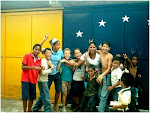
Niños de San Blás Petare Sur Caracas, 2004 - ht
Envía tus fotografías de barrios venezolanos y del mundo para incorporarlas a nuestra galería.
Escribe al correo: ciudadesdelagente@gmail.com
Escribe al correo: ciudadesdelagente@gmail.com
Etiquetas
- "Ilustraciones para la vivienda" I.
- 2011
- Banco Obrero. Un poco de historia.
- Barrio Tricolor invierte en zonas de alto riesgo
- Caracas.
- Catuche aún espera
- Cities Alliance. Trabajos.
- CLACSO II Reunión y II Congreso Latinoamericano y Caribeño de Hábitat Popular e Inclusión Social
- Congreso Latinoamericano y Caribeño de Hábitat Popular e Inclusión Social
- Constructores Populares.
- creadores de esperanza en tiempos de incertidumbre"
- Damnificados en Venezuela por causa de las lluvias. Reunión CCG enero 2011
- Derechos humanos en los medios comunitarios. UNESCO.
- Día de los Derechos Humanos.
- DIa del Derecho a la Verdad ONU 2011
- Día Mundial de los Derechos Humanos 2010
- Día Mundial del Hábitat 2010. Caracas FAU - UCV
- Editorial (II) / Iris Rosas
- Editorial (III) / Teresa Ontiveros
- Editorial (IV). El papel de la universidad en la sociedad actual. Mildred Guerrero.
- Editorial / Teolinda Bolívar
- El barrio es una obra en proceso (Amaya)
- El derecho a una vivienda adecuada. Folleto informativo No. 21 - ONU-HABITAT 2010
- El Estatuto de Brasil. Un Comentario. Cities Alliance. 2010.
- En memoria del Ing. Enrique Castilla Q.E.P.D.
- Encuentro de Organizaciones Sociales 2012 Caracas - Universidad Católica Andrés Bello (UCAB)
- Entrevista a Renny Colmenares
- Entrevista al dirigente Juan Castellano
- Estado Social Comunal
- Eventos internacionales: FORO URBANO MUNDIAL 2012
- Feliz Navidad y Año Nuevo 2012
- I Foro-Encuentro Universitario por el Hábitat de las Comunidades
- II Congreso Clacso "Hacedores de Ciudad" - Caracas 2011.
- Informe de Estado de la Población Mundial 2009
- Inscripciones
- Invihami ayudará a reparar 16 mil casas
- Invitación: "Barrios de Caracas
- INVITACIÓN: CONVERSATORIO CON MAGALY SANCHEZ E YVES PEDRAZZINI
- La precariedad como política. Prof. Alberto Lovera
- Legislación de emergencia y refugios. Venezuela.
- Ley de Tierras Urbanas
- LEY ESPECIAL DE REGULARIZACIÓN INTEGRAL DE LA TENENCIA DE LA TIERRA. VENEZUELA 2011
- Ley para la Emergencia de Tierras Urbanas y Vivienda (2010). Venezuela.
- Los estudiantes y la Escuela de Arqutiectura en la comunidad
- Manifiesto del CCG. MAS ALLÁ DE LA CONTINGENCIA…
- Normas política habitacional 2009
- Nota de duelo
- Noticias: Josefina Baldó / política habitacional / Venezuela
- Parranda navideña en el barrio Julián Blanco
- Pasantía Académica II Congreso CLACSO "Hacedores de Ciudad"
- Pela legalizacao das favelas cariocas. Edesio Fernandes
- Petare
- Petare Norte.
- Plan Barrio Tricolor
- Pobreza extrema aumentó en 14 estados durante el último año
- Propuesta para mejorar la calidad de vida del Barrio Julián Blanco
- Proyecto "Barrios Nuevos" - Caracas- 2012
- proyecto Ley de Participación Ciudadana
- Publicación. FAVELA E MERCADO INFORMAL
- Publicaciones: Fórum de Direito Urbano e Ambiental – FDUA
- Recapitulando: Segundo Congreso Latinoamericano y Caribeño de Hábitat Popular e Inclusión Social - Caracas
- Reseña: Un Centro de Abastecimiento Comunal para la economía informal y otras propuestas. Parroquia La Vega. Caracas.
- Reunión de la RedSCA abril 2010
- Revisitando o instituto do tombamento. Brasil.
- Serie entrevistas a líderes comunitarios: Consejos Comunales en Venezuela (I)
- TERREMOTO EN HAITÍ. ACTUAR Y REFLEXIONAR.
- Texto Ley de los Consejos Comunales 2009
- Un poco de historia (II)
- Una calle para El Petróleo (in memoria del Sr. Humberto Colmenares)
- Una calle para El Petróleo (parte II)
- Violencia en los barrios. El Nacional.
Archivo del Blog
Seguidores
Contáctanos
Coordinación: centrocg932@gmail.com
Blog: ciudadesdelagente@gmail.com
Edición y publicación del Blog: Prof. Hilda Torres; e-mail: torresmiery@gmail.com
ht/
Blog: ciudadesdelagente@gmail.com
Edición y publicación del Blog: Prof. Hilda Torres; e-mail: torresmiery@gmail.com
ht/
Vínculos
Facultad de Arquitectura y Urbanismo. Universidad Central de Venezuela
http://www.fau.ucv.ve/
Observatorio Venezolano de violencia
http://www.observatoriodeviolencia.org.ve/site/
Fundación Vivienda Popular
http://www.viviendaenred.net/
http://www.fau.ucv.ve/
Observatorio Venezolano de violencia
http://www.observatoriodeviolencia.org.ve/site/
Fundación Vivienda Popular
http://www.viviendaenred.net/

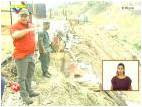

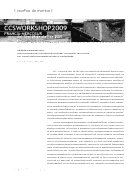



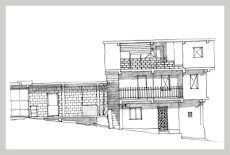


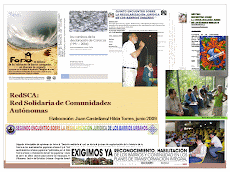


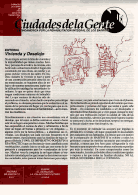

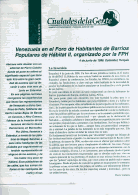
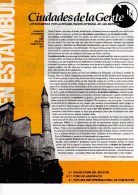
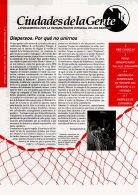

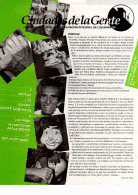
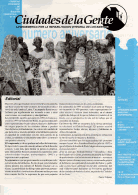



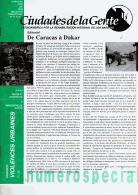
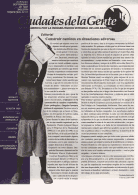
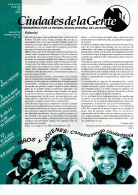
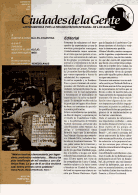
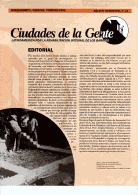



No hay comentarios.:
Publicar un comentario